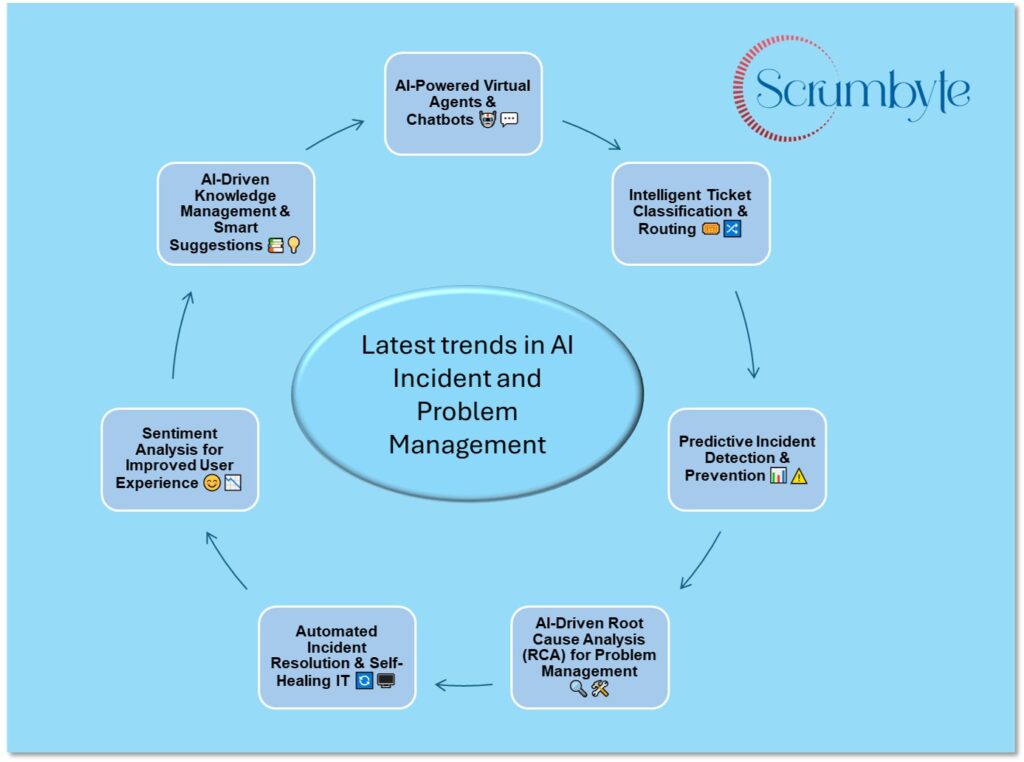
How AI in ITSM is Transforming Support Call Centers
Overview
In this blog we are discussing How AI in ITSM is Transforming Support Call Centers with a specific focus on Incident & Problem Management and its trends.
AI is revolutionizing support call centers by making Incident and Problem Management faster, smarter, and more proactive. Traditional support centers relied heavily on human intervention, manual ticketing, and reactive troubleshooting. Now, AI-powered ITSM solutions are automating incident resolution, predicting issues before they escalate, and enhancing overall service efficiency. Without further ado, let us dive into the trends that are being redefined in the new ITSM AI world.
Latest Trends in AI-Driven Incident & Problem Management

AI-Powered Virtual Agents & Chatbots
🔹 AI-driven virtual assistants handle routine IT support requests, reducing the burden on human agents.
🔹 Chatbots integrated into ITSM platforms provide real-time troubleshooting, ticket creation, and status updates.
Example: A user reports a VPN connectivity issue; the AI chatbot analyzes logs, applies fixes, and closes the ticket—without human intervention.
Intelligent Ticket Classification & Routing
🔹 AI automates ticket categorization, ensuring accurate assignment to the right teams.
🔹 Reduces misrouted tickets, minimizing resolution delays.
Example: AI identifies network-related incidents from past records and routes them to the network operations team instead of general IT support.
Predictive Incident Detection & Prevention
🔹 AI analyzes historical data to predict system failures before they happen.
🔹 IT teams proactively address issues, reducing downtime.
Example: AI detects unusual spikes in CPU usage, preventing an imminent server crash by automating resource allocation.
AI-Driven Root Cause Analysis (RCA) for Problem Management
🔹 AI analyzes patterns across multiple incidents to identify recurring issues.
🔹 Eliminates guesswork, enabling faster permanent fixes instead of temporary solutions.
Example: AI correlates multiple Wi-Fi outage incidents and detects a faulty firmware update as the root cause, preventing further disruptions.
Automated Incident Resolution & Self-Healing IT
🔹 AI applies automated fixes, reducing manual intervention in repetitive tasks.
🔹 Self-healing systems detect and resolve issues without human action.
Example: AI monitors disk space usage, automatically cleans logs, and prevents storage-related incidents.
Sentiment Analysis for Improved User Experience
🔹 AI analyzes user feedback and ticket interactions to detect frustration levels.
🔹 Enhances service desk operations by prioritizing urgent cases and improving response strategies.
Example: AI flags a customer’s negative sentiment from multiple unresolved issues, triggering an escalation to a senior support engineer.
AI-Driven Knowledge Management & Smart Suggestions
🔹 AI dynamically suggests solutions based on past incidents and recommends knowledge articles.
🔹 Reduces resolution times by providing instant, accurate answers to support agents.
Example: AI suggests a step-by-step fix for a software crash, enabling L1 agents to resolve issues without escalation.
The Future of AI in ITSM for Support Call Centers
✔️ Hyper-Automation – Increased AI-led automation for self-resolving IT incidents.
✔️ AI-First Support Models – Human agents will handle only complex, high-priority issues.
✔️ Autonomous ITSM Systems – AI will proactively manage IT health, preventing incidents before they happen.
✔️ AI-Driven Compliance & Security Monitoring – AI will monitor and enforce ITSM compliance rules in real time.
AI-powered ITSM is reshaping support call centers—making them smarter, proactive, and highly efficient. The future is not about replacing human agents but empowering them with AI-driven insights and automation to provide faster, better support. However, there are bound to be new challenges that accompany futuristic concepts. Let us look into some of them and how they are going to be met.
Challenges Facing the Call Center Industry & Future Outlook
The call center industry is undergoing rapid transformation due to changing customer expectations, rising operational costs, and the integration of AI-driven automation. While these changes bring new opportunities, they also introduce significant challenges that call centers must navigate to remain competitive.
Top Challenges in the Call Center Industry
Rising Customer Expectations & Demand for Instant Support
🔹 Customers expect faster, personalized, and 24/7 support across multiple channels.
🔹 Long wait times and ineffective issue resolution lead to customer dissatisfaction and churn.
Example: A frustrated customer who doesn’t get immediate assistance on a chatbot is likely to abandon the service.
High Employee Turnover & Agent Burnout
🔹 Call centers experience one of the highest attrition rates due to job stress, repetitive work, and lack of career growth.
🔹 Hiring and training new agents is costly and time-consuming.
Example: An agent handling angry customers daily without AI assistance may feel exhausted, leading to lower productivity and resignation.
Balancing Cost Efficiency with Service Quality
🔹 Call centers must reduce operational costs while maintaining high-quality customer service.
🔹 AI-powered automation can help, but initial investments can be expensive.
Example: Outsourcing to lower-cost regions can reduce expenses but might impact service quality due to language and cultural barriers.
Security & Compliance Risks
🔹 Handling sensitive customer data increases the risk of cybersecurity breaches and fraud.
🔹 Call centers must comply with GDPR, CCPA, and PCI-DSS to protect customer privacy.
Example: A data breach exposing customer financial details can lead to legal penalties and loss of trust.
Integration of AI & Automation
🔹 AI-driven tools improve efficiency but require seamless integration with existing ITSM and CRM systems.
🔹 Resistance from agents fearing job loss can slow AI adoption.
Example: A chatbot answering basic customer inquiries allows human agents to focus on complex problem-solving, improving job satisfaction.
Multichannel & Omnichannel Support Complexity
🔹 Customers engage through voice, email, chat, and social media, requiring a unified support experience.
🔹 Inconsistent responses across channels damage brand reputation.
Example: A customer who gets a different answer on live chat vs. phone support may lose confidence in the service.
Future Outlook of the Call Center Industry
✔️ AI-Driven Automation & Self-Service Growth – AI-powered chatbots, voice assistants, and predictive analytics will enhance efficiency and reduce costs.
✔️ Hybrid Human-AI Support Models – AI will handle routine queries, while human agents focus on complex issues and customer relationship-building.
✔️ Greater Focus on Employee Well-Being – Call centers will prioritize better training, AI assistance, and mental health support to reduce burnout.
✔️ Advanced Security & Compliance Measures – Stronger AI-driven fraud detection and biometric authentication will improve data security.
✔️ True Omnichannel Customer Experience – Integrated platforms will provide seamless support across all communication channels.
The call center industry is evolving rapidly, and companies that embrace AI, automation, and employee-centric practices will lead the future of customer service.
Authored by Vijay Chander – Scrumbyte – 2025 – All rights reserved
